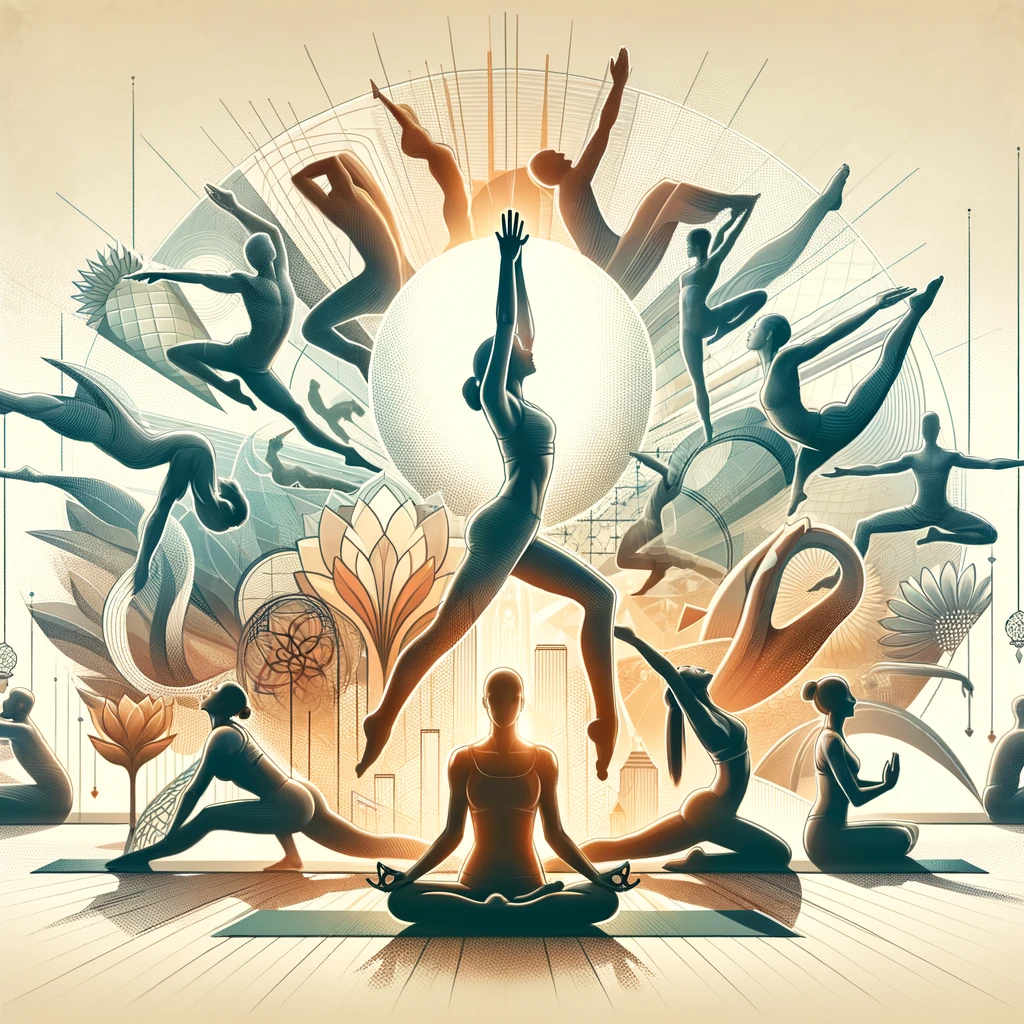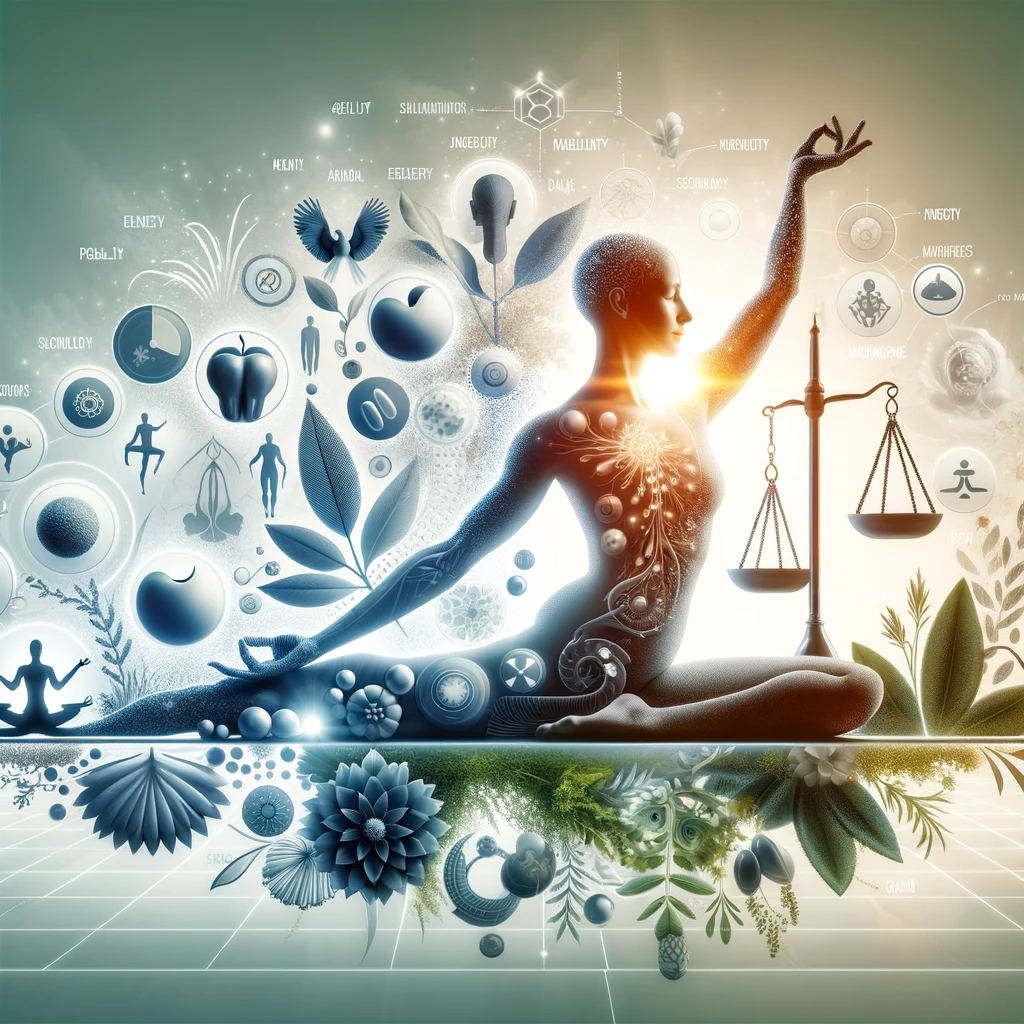Revitalize Your Life: Discover the Power of Hatha Yoga
 Daylight to twilight, your life is action-packed. Be it cultivating crops, chasing the perfect shot, pioneering trails, delivering lectures, debugging code, or caring for patients, your days are full of dynamic activities. Yet, those persistent joint aches and muscular strains are the unwanted hurdles that pause your momentum. It's time to rediscover your zest and transition into a more vibrant, healthful state with the practice of Hatha Yoga.
Daylight to twilight, your life is action-packed. Be it cultivating crops, chasing the perfect shot, pioneering trails, delivering lectures, debugging code, or caring for patients, your days are full of dynamic activities. Yet, those persistent joint aches and muscular strains are the unwanted hurdles that pause your momentum. It's time to rediscover your zest and transition into a more vibrant, healthful state with the practice of Hatha Yoga.
What is Hatha Yoga?
 Hatha Yoga, rooted in the rich soils of ancient India, is a time-tested path towards enhanced physical strength, mental clarity, and overall wellness. It's a journey that invites balance into every aspect of life. Unlike modern styles like Vinyasa Yoga, which can often seem like an overwhelming whirlwind of fast-paced flows and challenging poses, Hatha offers a serene sanctuary where each pose is savored with mindfulness.
Hatha Yoga, rooted in the rich soils of ancient India, is a time-tested path towards enhanced physical strength, mental clarity, and overall wellness. It's a journey that invites balance into every aspect of life. Unlike modern styles like Vinyasa Yoga, which can often seem like an overwhelming whirlwind of fast-paced flows and challenging poses, Hatha offers a serene sanctuary where each pose is savored with mindfulness.
The Pillars of Hatha Yoga
 At the heart of Hatha Yoga lie two fundamental pillars – asanas (physical postures) and pranayama (breathing techniques). Together, they form a harmonious dance that enhances not just your physical prowess but also mental equanimity.
At the heart of Hatha Yoga lie two fundamental pillars – asanas (physical postures) and pranayama (breathing techniques). Together, they form a harmonious dance that enhances not just your physical prowess but also mental equanimity.
The Power of Asanas
 Asanas, or postures, form the cornerstone of any Hatha Yoga practice. The broad range of poses that pepper a typical Hatha class each serve their purpose – some enhance flexibility, others boost strength; some foster balance, others promote relaxation. And while these postures might appear simple at first glance, holding them for extended periods unlocks deeper layers of strength, flexibility, and focus. Plus, the slower pace of Hatha allows more time to fine-tune your alignment and reduces the risk of injuries.
Asanas, or postures, form the cornerstone of any Hatha Yoga practice. The broad range of poses that pepper a typical Hatha class each serve their purpose – some enhance flexibility, others boost strength; some foster balance, others promote relaxation. And while these postures might appear simple at first glance, holding them for extended periods unlocks deeper layers of strength, flexibility, and focus. Plus, the slower pace of Hatha allows more time to fine-tune your alignment and reduces the risk of injuries.
The Magic of Pranayama
 Hatha Yoga places a significant focus on Pranayama, which refers to the practice of conscious breathing. This aspect of Hatha Yoga is fundamental, acting as the core element that interlinks all its components. Pranayama is often considered the golden thread that weaves the rich tapestry of Hatha Yoga, binding together the various postures and movements into a cohesive and harmonious practice. The act of deliberate and mindful breathing is central to achieving the balance and rhythm essential in Hatha Yoga, enabling practitioners to fully engage with the practice and derive its benefits.
Hatha Yoga places a significant focus on Pranayama, which refers to the practice of conscious breathing. This aspect of Hatha Yoga is fundamental, acting as the core element that interlinks all its components. Pranayama is often considered the golden thread that weaves the rich tapestry of Hatha Yoga, binding together the various postures and movements into a cohesive and harmonious practice. The act of deliberate and mindful breathing is central to achieving the balance and rhythm essential in Hatha Yoga, enabling practitioners to fully engage with the practice and derive its benefits.
Deep and mindful breathing in Hatha Yoga serves as a powerful tool for connecting the mind and body, fostering a sense of groundedness in the present moment. This conscious breathing sharpens one's awareness, making practitioners more attuned to their physical and mental states. It also plays a crucial role in revitalizing energy, leading to a rejuvenation of both body and spirit. Additionally, the practice of Pranayama has been found to be effective in alleviating symptoms associated with stress and anxiety, offering a therapeutic aspect to those who engage in Hatha Yoga. Through this focused breathing, Hatha Yoga becomes more than just a physical exercise; it transforms into a holistic practice that nurtures the mind, body, and spirit.
Hatha Yoga: Beyond Physical Fitness
 While the physical benefits of Hatha are plenty – strength, flexibility, balance – Hatha Yoga isn't merely an exercise routine. It's a potent tool for spiritual development.
While the physical benefits of Hatha are plenty – strength, flexibility, balance – Hatha Yoga isn't merely an exercise routine. It's a potent tool for spiritual development.
Hatha Yoga and Spirituality
 Hatha’s rich lineage traces back to ancient texts like the Hatha Yoga Pradipika and the Yoga Sutras – sacred scriptures that emphasized the role of Hatha as a stepping stone towards Raja Yoga or the "royal path". Raja Yoga ventures beyond the physical body to navigate the realms of the mind. By practicing Hatha classical hatha Yoga, you're not only sculpting a stronger body but also paving a path towards heightened self-awareness and spiritual evolution.
Hatha’s rich lineage traces back to ancient texts like the Hatha Yoga Pradipika and the Yoga Sutras – sacred scriptures that emphasized the role of Hatha as a stepping stone towards Raja Yoga or the "royal path". Raja Yoga ventures beyond the physical body to navigate the realms of the mind. By practicing Hatha classical hatha Yoga, you're not only sculpting a stronger body but also paving a path towards heightened self-awareness and spiritual evolution.
The Versatility of Hatha Yoga
 Yoga is a practice that embraces diversity in its application, recognizing that each individual has distinct needs and objectives. This is especially evident in Hatha Yoga, a form that proves to be adaptable and accommodating to various lifestyles. Whether you are engaged in physically strenuous tasks on a farm or in need of mental clarity for your artistic endeavors, Hatha Yoga offers a tailored approach. Its flexibility allows it to meet the specific requirements and aspirations of each practitioner, providing a personalized experience that goes beyond traditional exercise routines.
Yoga is a practice that embraces diversity in its application, recognizing that each individual has distinct needs and objectives. This is especially evident in Hatha Yoga, a form that proves to be adaptable and accommodating to various lifestyles. Whether you are engaged in physically strenuous tasks on a farm or in need of mental clarity for your artistic endeavors, Hatha Yoga offers a tailored approach. Its flexibility allows it to meet the specific requirements and aspirations of each practitioner, providing a personalized experience that goes beyond traditional exercise routines.
The essence of Hatha Yoga lies not in achieving physical feats like touching your toes, but rather in the journey and lessons learned along the way. It's a process of discovery, where the focus is on the experience and understanding gained during each pose and movement. This perspective shifts the emphasis from mere physical achievement to a deeper exploration of one's self. Hatha Yoga encourages a holistic approach, where the journey becomes as important as the destination, fostering a deeper connection with oneself and enhancing overall well-being.
The Health Benefits of Regular Hatha Yoga Practice
 Hatha Yoga offers a wide range of health benefits with regular practice. It enhances physical fitness, increasing agility, strength, and flexibility, and improves mental health by fostering a sense of well-being and balance.
Hatha Yoga offers a wide range of health benefits with regular practice. It enhances physical fitness, increasing agility, strength, and flexibility, and improves mental health by fostering a sense of well-being and balance.
Beyond physical fitness, Hatha Yoga boosts energy levels and reduces stress and anxiety. It also provides relief from muscle and joint pains, making it a comprehensive practice for overall health and wellness.
Mental Health and Hatha Yoga
 One of the often-overlooked benefits of Hatha Yoga is its potential for mental health improvement. In our fast-paced world, stress, anxiety, and depression are all too common. The mindful breathing and meditation practices embedded within Hatha can help you cultivate an inner sense of calm and clarity, giving you the resilience to navigate life’s challenges with greater ease.
One of the often-overlooked benefits of Hatha Yoga is its potential for mental health improvement. In our fast-paced world, stress, anxiety, and depression are all too common. The mindful breathing and meditation practices embedded within Hatha can help you cultivate an inner sense of calm and clarity, giving you the resilience to navigate life’s challenges with greater ease.
Conclusion: Your Journey with Hatha Yoga
 Hatha Yoga isn't about perfecting the most complex yoga postures or holding your breath for incredible durations. It's about learning to listen to your body, respecting its limits while gently nudging it towards its full potential. It’s about finding calm in chaos and clarity in confusion.
Hatha Yoga isn't about perfecting the most complex yoga postures or holding your breath for incredible durations. It's about learning to listen to your body, respecting its limits while gently nudging it towards its full potential. It’s about finding calm in chaos and clarity in confusion.
So, are you ready to embrace Hatha Yoga and invite balance into your life? Go ahead! Give it a shot. Remember, Rome wasn't built in a day – and your yoga practice won't be either. But as you stick with it, you’ll find the journey rewarding, each step leading you closer to a healthier, happier version of yourself.
Hatha Yoga – it’s not just about doing; it’s about being.
Key Benefits of Hatha Yoga:
- Enhances physical strength and flexibility
- Boosts energy levels
- Promotes mental clarity and focus
- Alleviates stress and anxiety
- Encourages spiritual development
- Can ease mild joint pains and muscle tension
- Invites balance into every aspect of life
Frequently Asked Questions
1. What is Hatha Yoga?
Hatha Yoga is a traditional form of yoga that focuses primarily on balancing physical postures (asanas) and breath control (pranayama) to improve strength, flexibility, and mental clarity.
2. How is Hatha Yoga different from other forms of yoga?
Unlike more vigorous yoga styles, like Vinyasa Yoga, Hatha Yoga places a strong emphasis on holding poses for a longer duration and mastering breathing techniques. It’s often slower-paced, making it ideal for beginners.
3. Who can practice Hatha Yoga?
Almost anyone can practice Hatha Yoga! It’s suitable for all ages and fitness levels. As always, it’s best to consult with a healthcare provider before starting any new fitness regimen.
4. Can Hatha Yoga help with my joint pain?
While Hatha Yoga cannot cure joint pain, regular practice can potentially help manage symptoms by improving flexibility, strength, and range of motion.
5. I'm new to yoga. Is Hatha a good starting point?
Absolutely! Hatha's slower pace and focus on foundational poses make it an excellent starting point for beginners.
6. How often should I practice Hatha Yoga?
Frequency of practice depends on individual goals and lifestyle. However, a consistent routine – even if it’s just 15-20 minutes a day – can yield significant benefits over time.
7. Can Hatha Yoga improve my mental health?
Yes, the yoga taught mindful breathing and meditative aspects of Hatha Yoga can help alleviate stress and anxiety, promoting better mental health.
8. Is Hatha Yoga a good workout?
Yes! Though it may be slower paced than some other forms of yoga, Hatha Yoga can still provide a comprehensive workout that improves strength, flexibility, and balance.
9. Will I lose weight with Hatha Yoga?
While Hatha Yoga isn't a high-intensity workout geared towards rapid weight loss, its combination of physical activity and stress-reducing practices can support healthy weight management.
10. Is Hatha Yoga spiritual?
While Hatha Yoga has deep roots in spiritual traditions, your practice can be as spiritual (or not) as you choose. It's about personal growth and finding balance in mind and body.
11. Do I need any special equipment for Hatha Yoga?
A yoga mat is the primary requirement for most modern yoga and practices, including Hatha. Props like blocks and straps can be helpful but aren't necessary for beginners.
12. What should I wear to a Hatha Yoga class?
Comfortable, breathable clothing that allows for a full range of motion is ideal for Hatha Yoga.
13. What should I expect in my first Hatha Yoga class?
Expect a balanced blend of physical postures, breathing exercises, and relaxation techniques. The class will likely start with gentle warm-ups, move into standing and seated yoga poses throughout, and end with relaxation.
14. I'm not flexible. Can I still do Hatha Yoga?
Absolutely! Flexibility is a result of yoga, not a prerequisite. Hatha Yoga helps you gradually improve flexibility over time.
15. Can Hatha Yoga help improve my posture?
Yes! Regular practice of the asanas in Hatha Yoga can strengthen the muscles that support good posture proper breathing.
16. Can children do Hatha Yoga?
Yes! Children can benefit from the physical exercise and stress-reducing aspects of Hatha Yoga, though the practice should be appropriately modified for their age and development.
17. Can seniors do Hatha Yoga?
Yes! Seniors can gain significant benefits from the low-impact, flexibility-boosting characteristics of Hatha Yoga. However, they should consult their doctor beforehand and ensure the class is suitable for their fitness level.
18. Can I do Hatha Yoga at home?
Yes! While beginners might benefit from attending a class or two to get familiar with the fundamentals, Hatha Yoga can be practiced at home once you understand the basics.
19. How can I find a Hatha Yoga class near me?
Finding a Hatha Yoga class near you is easier than you might think! A great place to start is Total Harmony Integrated Wellness. They offer a comprehensive list of Hatha Yoga classes, workshops, and events tailored to various skill levels and personal preferences. To find a class that suits your needs, simply visit their website and use their intuitive search feature. You can filter classes by location, instructor, and schedule, making it easy to find the perfect match for your yoga journey. Don't forget to check out their reviews and instructor profiles for additional insights. Start your path to wellness and balance with Total Harmony Integrated Wellness today!
20. What should I do if a pose feels uncomfortable or painful during Hatha Yoga?
Never force your body into discomfort or pain. If a pose doesn't feel right, back off or ask your instructor for a modification.
